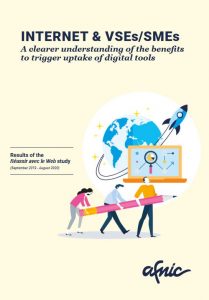Afnic, the association in charge of .fr domain names, publishes the 2019/2020 results of its annual “Succeeding with the web” study. It analyzes the online presence of more than 3,500 VSEs / SMEs across the country *.
Afnic has devoted part of its activity for several years to supporting VSEs / SMEs to develop an efficient and controlled online presence. More than 30,000 companies were made aware in 2020 via the Foliweb workshops and the Réussir-en.fr program.
What should we remember from this new edition?
- Respondents are well aware of the challenges of an internet presence, which they consider essential and a source of benefits for their business (even if they do not know how to quantify these benefits or identify them concretely). 100% of respondents consider this presence useful for their activity, even essential for 70%. SMEs seem to be the most convinced.
- They are also very vigilant with regard to the issues of managing their identity on the Internet, favoring the use of their own domain name (90% of them have their own domain name).
- The regular publication of interesting content, making visitors want to learn more about the company and / or buy its products and services can be improved. While 95% of respondents present their activity, only 40% offer value-added content and 9% publish it every day. Here again, SMEs stand out, having more resources to devote to this dimension of their online presence.
- The development of visibility and e-reputation are far behind other actions: 67% of respondents do not take any advertising action. Practices are a little better in terms of interaction management: 53% of respondents state that they monitor the opinions and comments sent to them, and respond to them systematically; but 64% never carry out an evaluation of the satisfaction of their customers.
- Referencing (SEO): a logical corollary of the points already mentioned, referencing is most often natural (65%), with the consequence that only 35% of respondents believe they appear in the first pages of results of major search engines.
- Types of presence: consistent with the previous point, most respondents “content themselves” with a website (67%) and / or pages on major social networks (79%), but without seeking to do so. know or refer to other sites or platforms, or seek to sell on the internet. The presence on social networks, often essential to effectively reach the targeted targets, seems to be on the rise since 2017, but only 26% of respondents consider it profitable for their business.
- The notion of investment and return on investment: budgets remain very low overall (62% are less than 300 euros per year), respondents compensating in time spent for what they cannot invest (46% devote an hour to it per day or more). But the dominant impression of respondents is that these investments in time and money remain unprofitable, 54% believing that they make less than 10% of their turnover thanks to the internet, or not knowing how to evaluate it. SMEs stand out from the crowd with larger budgets, but only 32% of them report achieving more than 10% of their turnover on the internet.
In the new edition of this study, the findings made during the two previous campaigns remain largely valid: unavoidable nature of the online presence but rather vague perception of the benefits, culture still very anchored in the real world, lack of digital strategy, often insufficient skills and resources.
All the factors are intertwined. The lack of vision on what the company can hope to gain from its presence on the internet induces a fairly great caution in terms of investments, caution reinforced by the often justified perception of the internet as something too technical despite the proliferation turnkey offers to create a simple website or e-commerce. Yet the perception of the stakes is high, and it translates into time spent on the online presence despite the idea that the ROI will be low or uncertain.
VSEs / SMEs seem to have an internet presence “because it has to be” but not yet knowing how to link it to the concrete development of their business. It is from this persistent mismatch between motivation and the system put in place that most of the obstacles identified arise.
For an online presence to be effective and sustainable, there is a strong challenge of support, ownership and autonomy. Digital technology must allow the business owner to develop his value proposition, his customer relationship, to think about the fundamental elements that make up his corporate culture. This is where digital technology, and more particularly the online presence, can be fully integrated into everyday life.
Download the study "Succeeding with the Web 2020"
* Methodology: Data collected from 3,500 VSE / SME managers via an online questionnaire between September 1, 2019 and August 31, 2020.
About Afnic
Afnic is the acronym for Association Française pour le Nommage Internet en Coopération, the French Network Information Centre. The registry has been appointed by the French government to manage domain names under the .fr Top Level Domain. Afnic also manages the .re (Reunion Island), .pm (Saint-Pierre and Miquelon), .tf (French Southern and Antarctic Territories), .wf (Wallis and Futuna) and .yt (Mayotte) French Overseas TLDs.
In addition to managing French TLDs, Afnic’s role is part of a wider public interest mission, which is to contribute on a daily basis, thanks to the efforts of its teams and its members, to a secure and stable internet, open to innovation and in which the French internet community plays a leading role. As part of that mission, Afnic, a non-profit organization, has committed to devoting 11% of its Revenues from managing .fr Top Level Domain to actions of general interest, in particular by transferring €1.3 million each year to the Afnic Foundation for Digital Solidarity.
Afnic is also the back-end registry for the companies as well as local and regional authorities that have chosen to have their own TLD, such as .paris, .bzh, .alsace, .corsica, .mma, .ovh, .leclerc and .sncf.
Established in 1997 and based in Saint-Quentin-en-Yvelines, Afnic currently has nearly 90 employees.




